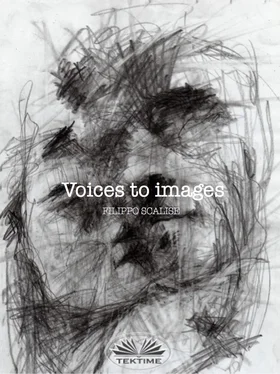Filippo Scalise - Voices To Images
Здесь есть возможность читать онлайн «Filippo Scalise - Voices To Images» — ознакомительный отрывок электронной книги совершенно бесплатно, а после прочтения отрывка купить полную версию. В некоторых случаях можно слушать аудио, скачать через торрент в формате fb2 и присутствует краткое содержание. Жанр: unrecognised, на английском языке. Описание произведения, (предисловие) а так же отзывы посетителей доступны на портале библиотеки ЛибКат.
- Название:Voices To Images
- Автор:
- Жанр:
- Год:неизвестен
- ISBN:нет данных
- Рейтинг книги:3 / 5. Голосов: 1
-
Избранное:Добавить в избранное
- Отзывы:
-
Ваша оценка:
- 60
- 1
- 2
- 3
- 4
- 5
Voices To Images: краткое содержание, описание и аннотация
Предлагаем к чтению аннотацию, описание, краткое содержание или предисловие (зависит от того, что написал сам автор книги «Voices To Images»). Если вы не нашли необходимую информацию о книге — напишите в комментариях, мы постараемся отыскать её.
Voices To Images — читать онлайн ознакомительный отрывок
Ниже представлен текст книги, разбитый по страницам. Система сохранения места последней прочитанной страницы, позволяет с удобством читать онлайн бесплатно книгу «Voices To Images», без необходимости каждый раз заново искать на чём Вы остановились. Поставьте закладку, и сможете в любой момент перейти на страницу, на которой закончили чтение.
Интервал:
Закладка:
FILIPPO SCALISE
VOICES TO IMAGES
Translated by Maria Burnett
Copyright © 2020 – Filippo Scalise
CHAPTER I
An impressive neo-Baroque palace in the Montjuic district of Barcelona. A mountain in the middle of the city. Hills covered with flowers, exotic trees and large cacti, right next to the luminous fountains of Gaieta Buigas.
From the very elegant and imposing entrance, graced by a small flowered garden, the large waiting room of Deis Frémont’s notary office was accessed through a large staircase of cold gray-pink marble.
Crossing a long corridor, subdivided in sequence by three very modern crystal and steel doors, was an imposing meeting room with warm and lived ancient bookcases that filled the walls, seeming to be at odds with the remaining modern furniture pieces.
The body of an elegantly dressed man lay on his back, on a huge red and blue Persian carpet. A large amount of blood, partly clotted, soaked the carpet just behind the nape of the man.
His name was Alberto Meriva. In Barcelona he was well known, since, three years earlier, he had made headlines as the “photographer of the voices."
As many young people of his age, Alberto also led a monotonous and futile life of the small town of Torredembarra, on Costa Daurada.
Many small low houses in colored plaster piled up untidily along a narrow coastal road, which seemed to border the fine pink sand of the beach.
Hours and hours spent under the scorching summer sun, hoping to sell fresh drinks to thirsty tourists, with no desire to better himself.
At twenty-five, fed up with days that were always the same, Alberto accepted his uncle Lorente's invitation to join him in Barcelona to work at the country's Telephone Company. Neither the father nor the mother opposed that choice. Perhaps their son would have had the chance to do what they could no longer even dream of. A long embrace with the father sealed a pact of trust and love through physical contact. During the train journey from the station of Tarragona to Barcelona, Garraf Natural Park and the Hospitalet de Llobregat passed quickly before his eyes and, during those few hours of travel, he became convinced that he himself would change his own existence. Arrived at the station of Sant Estacio, he remained motionless, without speaking a word, for quite a while, mesmerized by the architectural beauties of this new city. He did not think of anything specifically, merely enjoying this new freedom while taking deep breaths.
He was quickly brought back to reality by the arrival of a large crowd of people that, like a flooding river, transported him directly to the underground train bound for the University. It was a very quick ride, less than ten minutes, to the Passeg de Gracia. From there, he reached a small white door along the Carrer de Pau Claris.
His new home: a small, nicely furnished room adjoining Lorente's house had been offered to him by the Telephone Company along with his first real salary. He felt immediately safe and neatly arranged his few clothes inside the single large brown dresser that occupied almost completely the side wall of the room, then collapsed on the bed on which someone had nicely left a bottle of Porto. Many hours had passed, and Alberto had not yet spoken to anyone. Not a greeting or a request for information, nothing. He fell asleep without taking off his clothes.
Many small square lights alternated with worn gray keyboards on the wall of the customer service telephone switchboard. It was not a difficult job, but great patience and a great ability to listen to people was required; so many questions, so many complaints, so many requests, at times very basic.
He learned quickly. Alberto had always been a very smart young man, and, in a short time, he managed to learn how to communicate with customers, as well as to solve calmly all the problems that every day seemed to bring.
Alberto had never been a diligent student, but everyone knew him for his very special gift, which he had probably inherited from his mother: drawing.
He was really good! He was able to bring back to life images of daily life with such realism and precise details, that was called amicably "the photographer.” This happened when a drawing of class 3 ^ A, completed by the end of the school year and published in the School Newspaper, was mistaken by everyone for a photograph.
Unfortunately, no one, Alberto, the teachers, or the relatives understood that natural gift could and should have been cultivated as a great opportunity, for a young man who otherwise had no future.
After drawing the hills of his village, crammed with rows of black grapes on a splendid red wine label produced by the great San Laurente winery, owned by Count Francisco Petrosa, he no longer drew.
He spent his time walking barefoot through the beaches of Torredembarra to sell cold drinks to tourists who, especially on weekends, crowded the beaches of Costa Daurada.
Now he was happy. He had a job, a salary, a room, and a new city.
Almost unaware of his new gift, on a very sunny Sunday, Alberto decided to take a walk starting from the Placa del Portal de la Pau. After a few steps, something caught his attention in the window of a small shop.
A bottle of San Laurente red wine from 1997 with "his" label.
He hurried into the wine shop and bought the bottle. A strange feeling got a hold of him. For a moment, dozens of portraits came back to his mind, landscapes "photographed" as a boy and the serenity that accompanied those moments of fertile fantasy. He experienced a great desire to try to draw again.
A little further on, past the stalls of the antique market, overflowing especially with old vinyl records and paintings of dubious beauty, he stopped to buy a large white drawing pad and a pack of ten black pencils. He slowly walked back through the short stretch of road that separated him from his neighborhood, turning that bottle of wine in his hands like an old relic, a piece of his adolescence, of his life.
Returning home, his soul pervaded by an unexpected frenzy, he reproduced that same label in about twenty minutes; perfect, identical, even better than the original.
The next morning, he took the sketch pad to the office and placed it casually on his anonymous desk next to the flashing lights of the switchboard.
CHAPTER II
Calls began unceasingly. Mr. Garrano still complained about the excessive cost of the out-of-town calls and demanded a special price, having been a customer for over twenty years. Mr. Guarrentes had decided to permanently terminate the relationship with the Telephone Company, that had delivered, without his knowledge, the telephone records to his ex-wife. Alberto listened and replied as he was doodling on the white sheet placed in front of him.
A phone call caught his attention.
It was Mrs. Ramirez who, after two weeks, complained her line still had not been activated in her new home in Plaza de Saint Jaime, near Barcelona City Hall.
Not even knowing why, as he listened to that woman's voice, he began to scribble a face on the white sheet. As the call continued, the face became more and more detailed but, as the call ended quickly, he was not able to complete the portrait. Alberto did not feel like finishing it with his imagination and abandoned it absently on his gray desk.
The next day, as soon as he arrived at his office, he called Mrs. Ramirez with the excuse of letting her know her line had been activated and also to convey to her the apologies of the Management for the misunderstanding occurred.
In the meantime, he continued the drawing, which quickly took shape before his eyes, beginning to look more and more like a photograph, because of the three-dimensionality that Alberto was able to produce with a pencil. The call ended, and the drawing was finished.
Читать дальшеИнтервал:
Закладка:
Похожие книги на «Voices To Images»
Представляем Вашему вниманию похожие книги на «Voices To Images» списком для выбора. Мы отобрали схожую по названию и смыслу литературу в надежде предоставить читателям больше вариантов отыскать новые, интересные, ещё непрочитанные произведения.
Обсуждение, отзывы о книге «Voices To Images» и просто собственные мнения читателей. Оставьте ваши комментарии, напишите, что Вы думаете о произведении, его смысле или главных героях. Укажите что конкретно понравилось, а что нет, и почему Вы так считаете.











